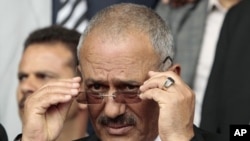Yemen's state media say that several officials wounded in Friday's attack on the presidential compound are being treated in Saudi Arabia, but officials denied a report that President Ali Abdullah Saleh is among them.
Yemeni officials said President Saleh is in a military hospital in Yemen receiving treatment for what they said were minor injuries suffered in the attack. Saleh has not been seen in public since then, but gave an audio address late Friday saying he was well.
Deputy Information Minister Abdu Janadi Saturday tried to counter reports that Saleh had left for treatment abroad.
He said that President Saleh is still in Sana'a, but the head of the parliament, the prime minister, and other officials have been taken to Saudi Arabia. He insists that President Saleh is in excellent health, and his injuries were light.
Officials blame members of the al-Ahmar clan for Friday's attack, which hit the president's mosque and, according to officials, killed seven people. Clan members deny they were involved, adding they would take credit if they had been.
Fighting between the government and al-Ahmar loyalists continued Saturday in the capital, with rocket fire and machine gunfire heard in the family's al-Hasaba district. While the forces arrayed against Saleh are many - political, military, tribal and Islamist - the violence has even some of his fiercest critics concerned.
General Abdullah Allawiya is a former defense minister who has broken with the president, and represents many of the opposition army officers.
He says they repeat their adherence to the peaceful nature of the revolution and strongly condemn all attempts by some parties to try to push the country into civil war.
The opposition wants Saleh to sign a Gulf Cooperation Council plan that would see a transition to a more representative government, but he has rejected it three times.
With no end to the violence in sight, more residents are trying to leave the capital, while at government checkpoints, troops are trying to prevent supporters of the al-Ahmar clan and the wider Hashid tribal federation from entering. Among those staying, there was widespread suspicion about both the extent of the president's injuries as well as the perpetrators of the attack - a tendency toward conspiracy resulting, in part, from decades of government media manipulation. This Sana'a resident believes the attack could have been for any number of reasons.
He says it could be the work of Saleh himself, or spring from internal disputes within the presidential palace, or even have been a mistaken attack intended for members of the al-Ahmar clan or political protesters who have been holding anti-government rallies.
Whatever the cause, the attack was the first time in the four months of unrest that the president's compound was hit. What began as peaceful political protests has threatened to spiral out of control in the past two weeks, with fighting in other cities, including Taiz and Zinjibar as well as the capital.
The upheaval is prompting more countries, including Germany, India and Britain, Saturday to work to evacuate their citizens or advise them to leave as soon as possible.














